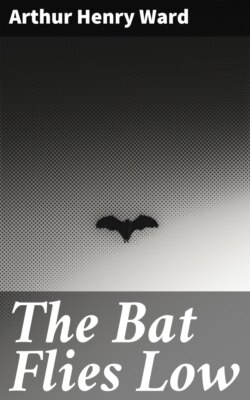Читать книгу The Bat Flies Low - Arthur Henry Ward - Страница 16
На сайте Литреса книга снята с продажи.
“HE IS CALLED THE BAT”
ОглавлениеTable of Contents
“The phone is ringing, sir.”
“I don’t hear any bell,” growled Maguire.
“I’m used to it, sir.”
“Answer, Lurgan,” Hayes directed.
Lurgan inclined his head and walked across the lobby. As he went out:
“What do you make of that bird?” Maguire asked, addressing Detective Sergeant Hawley.
“He’s clever, but he knows more than he tells.”
“In regard to his tes-tes-testimony,” Stefanson interrupted, “I th-think he’s t-telling the ab-absolute truth. He may know s-something b-bearing on the matter, but I think his evidence is sq-square.”
Captain Rorke came back. He overheard Stefanson’s words.
“I’m with you, Stefanson,” he said: “we have to look elsewhere for the clue to this mystery.”
Lurgan reappeared.
“Police headquarters, sir,” he reported. “Captain Anderson is asking for Mr. Maguire.”
Maguire stood up and went out.
Lurgan was crossing the lobby when:
“Hi! you!” The harsh voice was that of Hawley. “Don’t go: I’ve got something else to say.”
Lurgan paused, turned, and inclined his head. He stood still.
“I won’t say it now,” the detective sergeant went on, “but just stay where you are.”
Lincoln Hayes and Rorke exchanged glances. Stefanson expressed himself:
“In s-s-some ways, Detective S-Sergeant Haw-Haw-ley, y-you’re right,” he proclaimed, peering in that officer’s direction. “In another w-way—y-you’re wr-wrong.”
“Thank you,” said Hawley. “I guess I can manage my own affairs.”
Another awkward hiatus occurred. It was broken by Lincoln Hayes.
“Help yourself to a whisky, Paddy,” he directed: “it’s just at your elbow. Maguire could do with another one, I think; and I. And Lurgan——”
“Sir?”
“Two more Liebfraumilch small bin for Mr. Stefanson.”
“Very good, sir.”
“Have you relented, detective sergeant, or still on the water wagon?”
Detective Sergeant Hawley watched Lurgan as he moved across the lobby and disappeared; then:
“I suspect that man, Mr. Hayes,” he said harshly, the beady eyes registering anger. “If he makes a getaway, I’m the rabbit that’s going to be shot at.”
“Don’t worry,” Hayes replied, “he won’t make a getaway. Slim is outside, and so is the driver of the police car. Duties of a host, you know ... What about a lager beer?”
Detective Sergeant Hawley met the uncompromising stare of those strange, ingenuous eyes for a few moments ... and then gave in.
“Maybe two fingers of Scotch wouldn’t hurt me,” he admitted.
Maguire came back; his heavy-jowled face registered anger.
“Listen.” He stood in the doorway, his powerful voice audible across the wide lobby. “The Berengaria was late. They just turned her around. She sailed at 1 A.M. That is—” he glanced at his wrist watch—“half hour ago. Mohammed Ahmes Bey and his—niece are on board!”
Lincoln Hayes stood up, dusting ash from the lapel of his coat. He was smoking a cigarette.
“That certain?”
“It’s certain.”
“Good enough.”
“Well, what’ll I do? All evidence points to the fact that this Egyptian bird, spite of his credentials, has attempted the murder of your secretary and stolen valuable manuscripts from this house. Do we notify the French police and hold him at Cherbourg? It’s up to you. You haven’t taken me into your confidence. I don’t know the strength of these documents that have been stolen. What’ll I do? Say the word.”
There was a short tense silence. During it, Lurgan returned quietly, carrying two bottles immersed in an ice bucket. Everyone else was watching Lincoln Hayes. Presently he spoke.
“Do nothing,” he said. “I make no charge. I have my own plans.”
Detective Sergeant Hawley had crossed to a side table and poured himself out a drink. Now, he turned. He was a man who believed in Detective Sergeant Hawley. Lincoln Hayes automatically had earmarked him for success. Hawley was no respecter of persons: he had tremendous self-confidence.
“May I say something, Mr. Maguire?” he interrupted.
“Say what you like.”
“What I want to say is this:” (He pointed to Lurgan, who was uncorking one of the long-necked bottles.) “That man’s a spy!”
Lurgan did not turn; he continued to manipulate the corkscrew. Lincoln Hayes watched the speaker.
“What he said may be straight talking,” Hawley went on, “but what he hasn’t said is what we want to know. It isn’t his fault that murder hasn’t been done here tonight. Answer up, Lurgan. Am I right or wrong?”
Lurgan removed the cork, sniffed it, and placed it beside the ice bucket. He turned.
At which moment:
“Sssh—ssh!” came a voice from the balcony above.
A hush fell upon the company in the Venetian lobby. All stared upward.
Ann Wayland was coming downstairs!
She wore a flimsy nightrobe and was barefooted. An anxious-faced old nurse hovered behind her, hands outstretched to catch her if she should stumble. Dr. Adderley, from the balcony above, made imperious signs indicating silence.
She reached the foot of the stairs; she looked pale but very beautiful. In the sudden awesome quietude which her presence had created:
“He is called ‘the Bat,’ ” she said, her musical voice seeming to come from far away, her eyes staring straight ahead. “He is as old as Egypt and as wise. His wings hide the light because no one must see it. And so he is called ‘the Bat.’ To look upon the light is death....”
She extended her hands before her, gropingly, then clasped them, turned, and began to mount the stairs again. The anxious-faced old nurse pressed herself against the wall to allow Ann Wayland to pass—then followed her up.
Adderley’s hand remained outstretched, commanding silence. The slender figure, appropriately set in that strange apartment, retreated into the shadows above. On the balcony she stopped and looked down:
“He is called ‘the Bat,’ ” she said softly, her voice echoing about the lobby. “He has great power....”
